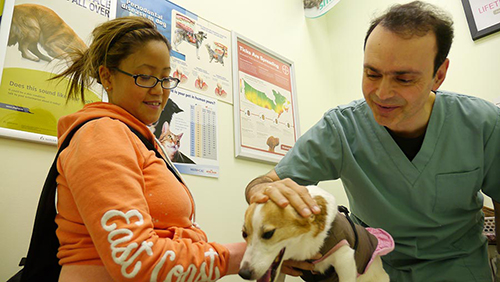
All normal dogs have a small number of Demodex species mites that live in their hair follicles. These mites are not visible to the naked eye. But some dogs develop an overgrowth of these mites, a condition called demodicosis, or demodectic mange.
WHAT YOU MAY NOTE
Signs of demodicosis can include hair loss, reddened skin, scabbing, crusting, and, sometimes, itching. Localized demodicosis
involves only small areas of skin on a dog. Generalized demodicosis involves most of a dog’s body or paws.
Diagnosis
Demodicosis is diagnosed by microscopically examining samples obtained from deep skin scrapings or hair plucks. In a skin scraping, a scalpel blade is used to gently but firmly scrape the skin layers to collect cells and parasites.
Treatments
Most dogs with localized demodicosis don’t need to be treated. But all dogs with generalized demodicosis do requiretreatment, which involves one of the following three medications:
1. Amitraz
Amitraz dip is an FDA-approved drug for this disease. The dips are usually applied either weekly or every two weeks, according to your veterinarian’s prescription. We generally recommend that dips be applied by technicians at a veterinary hospital. Whole-body clipping is
required throughout treatment so the dip solution can reach the mites in the hair follicles. The side effects of amitraz include transient sedation, a decrease in body temperature, a loss of appetite, vomiting, and diarrhea. Treatment with an antidote, yohimbine, can be used to decrease the severity of some amitraz dip side effects.
2. Ivermectin
Ivermectin is available as a liquid deworming agent for cows. It can be given orally daily to dogs to treat demodicosis. Some dogs, especially herding breed dogs, have a nervous system sensitivity to high doses of ivermectin. To help monitor for a sensitivity to ivermectin, all dogs are first given a low dose of ivermectin and are then gradually given a higher dose while being monitored for side effects. Signs of ivermectin sensitivity include decreased activity, drooling, loss of balance, vomiting, blindness, and seizures. A genetic test is also available to help determine whether your dog may be sensitive to ivermectin.
3. Milbemycin oxime
Milbemycin is available as a heartworm preventive tablet for dogs. It can be given daily to treat demodicosis. Some breeds can also have a nervous system sensitivity to high doses of milbemycin, but it is less common than ivermectin sensitivity. Signs of milbemycin sensitivity
include decreased activity, drooling, loss of balance, vomiting, and seizures.
Discontinue your dog’s monthly heartworm preventive while your dog receives daily ivermectin or milbemycin for demodicosis.
Your veterinarian may also prescribe an antibiotic to treat infection due to skin damage by the mite.
Treatment for demodicosis should be continued until no mites are found on two consecutive skin scrapings performed two to four weeks apart.
Some dogs with generalized demodicosis must have regular treatment for the rest of their lives, while others may be cured after months of treatment.
RELATED CONCERNS
Because juvenile-onset demodicosis is a familial disease, any dog that develops the generalized form of demodicosis at a young age should not be used for breeding. Dogs that develop demodicosis may require additional diagnostic tests to help identify any underlying health problems. Demodicosis is not contagious to people or other dogs.
